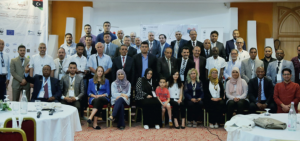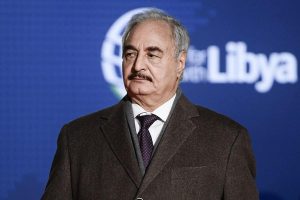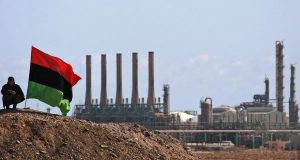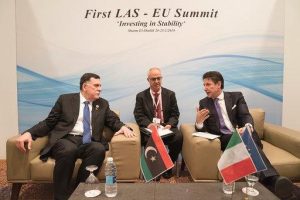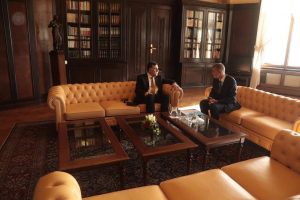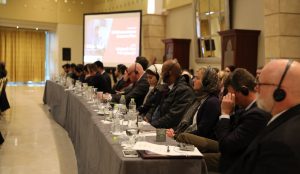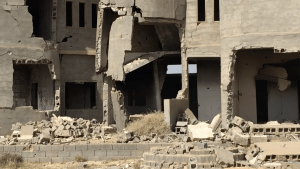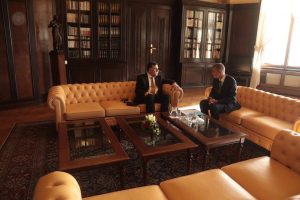WWF North Africa organised the closing conference of the project “Enabling Libyan NGOs to shape the future of the New Libyan Democracy (ELNLD)” funded by the European Union and the MAVA Foundation for Nature Conservation.
The conference was attended by over 20 environmental Libyan NGOs from different parts of Libya, the Civil Society Commission, the Environmental General Authority (EGA) as well as various international actors.
The ELNLD project has built and strengthened capacities of local Libyan civil society organisations working in the field of environment and sustainable development. Since its launch in 2014, the project has provided capacity building support to local environmental organisations through particular training courses in organisational, strategic and financial management, as well as in communication and networking skills.
The project has also contributed to the creation of the ‘Libyan Environmental Union for NGOs’ which is an active environmental network that links environmental NGOs and associations in Libya and has enabled networking of Libyan environmental NGOs with other like-minded organisations in the region (Tunisia and Jordan).
Hifter Frees Turkish Sailors
Six Turkish sailors were released by forces loyal to the east Libyan commander Khalifa Hifter Monday following a cascade of events that have both changed dynamics on the nation’s front lines and highlighted Ankara’s growing role in the ongoing conflict.
Hifter, who leads the Libya National Army (LNA) and controls much of the country’s eastern and southern regions, launched an offensive in April on Tripoli, the seat of UN-recognized Government of National Accord (GNA). Following months of intense fighting, a surprise defeat on Wednesday forced Hifter’s troops to retreat from a key front-line position on the outskirts of Tripoli.
Furious, Hifter ordered a “harsh response” to the loss while accusing Turkey of supplying his rivals with armed drones, weapons and military vehicles. The LNA imposed a ban on commercial flights from Libya to Turkey as well as a blockade on Turkish ships docking in the country. Then on Sunday, LNA forces destroyed an armed Turkish drone stationed in Tripoli’s Mitiga airport and detained six Turkish citizens in an unprecedented escalation between Hifter and Ankara.
By Monday afternoon, the Turkish citizens were released, but only after the Turkish Foreign Ministry warned Hifter his forces would become “legitimate targets” if the sailors were kept hostage. Now observers are monitoring the rising tensions between Hifter’s forces and Ankara, with many pointing to the recent events as more evidence of a growing proxy war being carried out Libyan soil, with Egypt, Saudi Arabia and the United Arab Emirates backing Hifter in the east, while Turkey and Qatar back the UN-recognized government in the west.
24% Increase in Libyan Oil Revenues
The National Oil Corporation (NOC) has announced May income of 2.3 billion USD from sales of crude oil and derived products, in addition to taxes and royalties received from concession contracts – a monthly increase of approximately 448 million USD (+24 percent).
Revenue figures were bolstered by sustained global oil prices, in addition to a busy crude loading schedule at the end of April resulting in cargo receipts both arriving and clearing in May’s revenue statement.
NOC chairman, Eng. Mustafa Sanalla commented:
“These figures showcase the importance of a unified oil sector and its contribution to the economy. Our focus on crude production, despite ongoing security challenges, continues to bring success with over 725 million USD having been spent on exploration and drilling since 2018.
“Oil revenues are the lifeblood of the Libyan economy. Any forced interruption of our work will undoubtedly impact our ability to maintain production and finance essential basic services. Despite repeated warnings, corporation facilities and operations are being directly targeted by conflict. NOC condemns all attempts to militarise national energy infrastructure.”
NOC rejects all attempts to portray the corporation as a party to the conflict. National oil revenues are disclosed and transferred to the Libyan Central Bank on a monthly basis. NOC is proud to work for all Libyans and serve as a benchmark for transparency amongst Libyan institutions.
PC’s head calls for a joint position towards the Libyan crisis
The Presidential Council’s (PC) head, Fayez Al-Sarraj, called for a more unified regional and international position towards the Libyan crisis and to stop the negative interference of some countries that are fueling the conflict and threatening stability in Libya.
During his meeting with Italian Prime Minister Giuseppe Conte on the sidelines of the Arab- European summit, in Sharm El-Shiekh, Sarraj underscored the need to stop any escalation that would undermine the political process, saying there is no military solution to the current crisis.
World Bank’s new Strategy to support Libya
New Partnership with Libya Focused on Economic Recovery and Improving the Lives of Libyans
The World Bank Group has announced a new strategy of support for Libya focused on restoring key services to citizens and promoting economic recovery as a critical contribution to the ongoing peace process.
Developed in response to a request from the Libyan government, the new strategy draws on the Bank Group’s global experience working with countries coping with instability and aims to address urgent priorities while laying the groundwork for future recovery and reconstruction.
The new strategy was presented in a Country Engagement Note (CEN) that outlines the Bank Group’s approach to supporting the Libyan people over the next three years. One of the two overarching goals of the CEN is to support concrete improvements in the lives of citizens by restoring access to dependable electricity and quality education and healthcare services.
The other principal goal is to accelerate economic recovery by helping build the capacity of the government to manage public funds, while developing the private and financial sectors. In addition, a common theme of all engagements under the CEN will be to promote transparency, accountability and inclusion in all government decision making and service delivery. This will contribute to restoring trust between citizens and their government, which is a critical foundation of stability.
“Libya has immense potential, despite current challenges,” said Marie Françoise Marie-Nelly, World Bank Country Director for the Maghreb and Malta. “If the peace process holds, Libya could leverage its natural resources, cultural heritage and well-educated population, particularly its youth with strong potential, to create a diverse and dynamic economy. We are determined to support the peace process and help Libya reach this goal by addressing current economic challenges that can aggravate political divisions and build instead an economy that works for all Libyans.”
The World Bank has been engaged with Libya for over a decade, helping to build capacities and modernize state institutions. The CEN is built on the knowledge gained and relationships developed during this period. The World Bank has followed an ‘All of Libya Approach,’ by convening and working with officials and representatives of civil society and the private sector from across the entire country.
The CEN will maintain this approach throughout all its engagements, from building the national budget to restoring health services. This focus on inclusion will also mean special attention paid to excluded groups, such as young people, women and internally displaced people, to ensure that basic services are reaching them and that policy decisions address their specific needs.
“The focus on inclusive services will also help address the migration crisis,” said Michael Schaeffer, World Bank Libya Country Representative. “Economic recovery coupled with the restoration and expansion of basic services will put the government in a much better position to host migrants with the standards of care they have committed to. The World Bank will also participate in the Migration Working Group established by the government as a vehicle for a range of international institutions and organizations to develop joint policies ad coordinate activities to address the international dimensions of the crisis.”
The program of support outlined in the CEN will be delivered through Technical Assistance and Reimbursable Advisory Services.
The World Bank will continue to coordinate closely with development partners in Libya, with the CEN based on areas where the Bank has comparative advantages. In view of the importance of the private sector for Libya’s future the CEN was developed in partnership with the Bank’s private sector arm, the International Finance Corporation (IFC), and the Bank’s Multilateral Investment Guarantee Agency (MIGA) that provides political risk insurance.
IFC will provide advisory services to support the development of public private partnerships, sources of financing for small and medium enterprises, and business support services. Should conditions improve and opportunities for private invest emerge, the IFC would be ready to support with investments and MIGA with risk guarantees.
Libya discusses Czech’s assistance in rebuilding projects
The Head of the Presidential Council (PC) Fayez Al-Sirraj has reviewed with the Czech Prime Minister the return of the Czech firms to work in Libya and their assistance in rebuilding projects.
Al-Sirraj’s media office said that reform in Libya includes encouraging foreign investments with friendly countries including the Czech Republic.
“We have activated cooperation agreements in health and economic with Czech to meet the demands of the public sector in the country.” Al-Sirraj said.
He also stressed the need for cooperation in fighting terrorism, organized crime and human trafficking as well as illegal immigration.
Meanwhile, the Czech Prime Minister reiterated support for the PC and hailed the efforts done in Libya to regain security and stability.
The Battle for Libya’s Southern Frontier
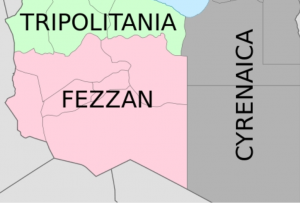
The battle for Libya’s southern frontier
Gunmen have made a fortune there as mercenaries, smugglers and robbers
The internecine fighting in Libya is often reduced to east versus west: Khalifa Haftar, the warlord who controls the former, against a United Nations-backed government in the latter.
But this year’s most important fighting is some 600km south of the capital, Tripoli. Last month General Haftar [Hiftar] sent his Libyan National Army (LNA) to pacify Fezzan, a vast expanse of desert plagued by ethnic and tribal feuds. It has already taken the town of Sabha, home to perhaps one-fifth of the area’s population. Now it is fighting for a bigger prize 200km to the south-west: the Sharara oilfield.
Before going offline in December it pumped 315,000 barrels per day (b/d). That was about a third of the country’s output, which had been at a five-year high. Then the tribesmen tasked with guarding the facility took it over to demand better pay.
The closure mothballed the nearby “Elephant” [El Feel, El Fil] oilfield, which relies on Sharara for electricity. That took another 73,000 b/d out of production.
UN Addressing Humanitarian Needs in Libya
Seven years after the revolution, hundreds of thousands of people across Libya, live in dire conditions.
In a bid to respond to the urgent humanitarian needs for 552,000 most vulnerable people living in Libya, the United Nations together with the Government of National Accord today launched the 2019 Humanitarian Response Plan (HRP2019), seeking US$202 million, to continue providing health support, protection, water, and shelter.
The UN Humanitarian/Resident Coordinator for Libya, Ms. Maria Ribeiro and H.E Dr Milad Al Taher, Minister of Local Governance, launched the HRP2019 in the Libyan capital, Tripoli. H.E. Fayez al-Sarraj, President of the Presidency Council, and Dr. Ghassan Salame, Special Representative of the Secretary-General for Libya and Head of the United Nations Support Mission in Libya (UNSMIL) participated in the event.
“Years of instability and insecurity have taken a toll on the wellbeing of many children, women and men in Libya. Each passing year, people struggle to withstand the impact of a crisis that has destabilized the country, put them in harm’s way, and ravaged the economy.” said Ms. Ribeiro. “Many thousands of families are unable to afford food, water and basic household items, and forced to take desperate measures just to get through these difficult times.”
The Plan reveals that an estimated 823,000 people, including 248,000 children, are in need of some form of a humanitarian assistance in Libya, and that half of them are Libyan citizens. Conflict-affected refugees and migrants in or transiting through the country make up the other half.
Hundreds of thousands of refugees and migrants face grave human rights violations and abuse in the absence of rule of law. Most of the refugees and migrants are young people from sub-Saharan Africa seeking opportunities to work and a better life.
“Respect for human rights is the key to moving forward towards stability in Libya. With stability there can be meaningful development,” said Ms Ribeiro. “Although humanitarian action is not the solution to the Libyan crisis, it remains crucial for the stability of Libya and paving the way for a lasting solution and is critical to allow hundreds of thousands in need to live in dignity and respect, hoping for a better future for them and their children”
In the past four years, the UN and its partners have made important progress by increasing humanitarian access, building stronger partnerships with national and local organizations and municipalities.
Last year, the UN and its partners received some US$81 million, which enabled them to provide humanitarian assistance to 320,000 of the most vulnerable people including 187,000 internally displaced people.
“The Humanitarian Response Plan is considered one of the most important plans for Libya during the ongoing transition and a key factor for achieving the stability and security in Libya. We greatly value the support provided by all UN organizations without exception, from infrastructure services to better access to health care, education and sanitation facilities,” said the Minister of Local Governance, Dr. Milad Al Taher.
Libya: Displaced Population Can’t Go Home
Most of the 48,000 former residents of the Libyan town of Tawergha, forcibly displaced for seven years, have not been able to return home, Human Rights Watch said today after visiting the town.
Despite reconciliation agreements that should have paved the way for Tawerghans’ return, the massive and deliberate destruction of the town and its infrastructure, and a pervasive feeling of insecurity, have kept all but a few families from returning. New satellite imagery analysis shows that between 2013 and 2017, when militias from the nearby city of Misrata effectively controlled Tawergha, over 20 kilometers of the city’s underground electric cable network was most likely removed and apparently stolen.
“The militias, predominantly from Misrata, that uprooted and expelled the Tawerghans didn’t stop there but presided over the city’s systematic destruction, apparently to ensure that the displaced would find it impossible to return,” said Hanan Salah, senior Libya researcher at Human Rights Watch. “The Government of National Accord should urgently devise a strategy for Tawerghans’ safe return, ensuring reconstruction and security, and accountability for militia members and commanders responsible for deliberate displacement and destruction.”
The International Criminal Court (ICC) prosecutor should consider possible war crimes and crimes against humanity against the Tawergha community as part of her office’s ongoing investigative efforts to address ongoing grave abuses in Libya, Human Rights Watch said.
An estimated 48,000 Tawerghans have been dispersed around the country since the uprising that ousted Muammar Gaddafi in 2011. In August of that year, the entire civilian population fled approaching anti-Gaddafi armed groups, predominantly from Misrata, fearing attacks and reprisals.
In what amounts to collective punishment and forced displacement, a possible crime against humanity, armed Misrata groups and civilian authorities subsequently blocked and threatened Tawerghans who tried to return home, accusing them of siding with Gaddafi and of committing atrocities against those seeking his overthrow. People from Tawergha were unable to visit, let alone return, to their homes until the signing of the peace charter in 2018.
Representatives of the two cities signed a reconciliation charter in June that in principle provided for the Tawerghans’ return. But as of December, only about 100 families have attempted to resettle in their hometown, according to the International Organization for Migration.
Returnees face a devastated infrastructure, with no electricity, running water, or telecommunications, and scant education and health services. Some said they still feared attacks and retaliation by Misrata militias.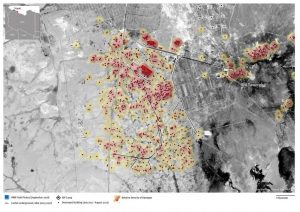
Human Rights Watch visited Tawergha in September and met with the Local Council, the main body representing and coordinating relief for the city, nongovernmental organizations, the commander in charge of security from the predominantly Misrata-staffed Central Military Region – a unit nominally aligned with the Government of National Accord’s (GNA) Defense Ministry, and eight Tawerghan families who had returned. Human Rights Watch also visited Misrata and met with municipal officials who negotiated the return process and are overseeing the implementation of peace agreements on Misrata’s behalf.
Human Rights Watch also interviewed by telephone in December five families from Tawergha living in Tripoli, Benghazi, and Ajdabiya, who have decided against returning, citing the destruction and security concerns. Names of those interviewed, other than officials, have been changed to protect them from possible reprisals.
Tawergha Local Council members told Human Rights Watch that all power stations, water purification plants, water distribution tanks, and underground electric cables had been looted or damaged to the point of being inoperable. A tour of the city confirmed that this appeared to be wholly or largely true. Researchers also found that all public administrative buildings, including the courthouse, and the main bank branch, the general hospital and many if not all 22 schools suffered damage, much of it apparently from arson, as well as looting.
Local Council members said that all of the town’s private houses and shops had also been looted and damaged. When researchers drove through the town, and in nearby agricultural areas close to the river, every structure they saw or stopped at appeared to have some structural damage, including some caused by fire.
Three council members said that when displaced Tawerghans first attempted to return to the town in 2013, armed groups from Misrata looted and destroyed the town further to prevent their return. Historic satellite imagery assessed by Human Rights Watch also shows continuing deliberate destruction of electricity infrastructure after April 2013.
Armed groups from Misrata and civilian authorities in that city have exercised effective control, without interruption, over Tawergha since August 2011. The armed groups were largely affiliated with the Misrata Military Council, which coordinated military activities of armed groups from Misrata in the aftermath of the 2011 revolution.
Armed groups from Misrata, given their effective control of the city since 2011 either destroyed and looted the town themselves, or allowed others to do so, Human Rights Watch said.
Under international human rights and humanitarian law, the GNA, as the recognized and competent government authority, is required to facilitate the voluntary, safe and dignified return of displaced people to their homes and help them recover their homes, property and possessions, Human Rights Watch said. The Libyan authorities are required to investigate and prosecute all those responsible for international crimes, including war crimes and crimes against humanity, including commanders who knew or should have known about the crimes committed by their subordinates and failed to take all reasonable steps to prevent the crimes.
During the visit, Human Rights Watch observed that, despite the GNA’s commitment, reconstruction and recovery have yet to start in earnest. As of December 2018, the state electricity company had installed only one electricity cable, for street lights, on part of the main road. One NGO was retrieving unexploded remnants, and international organizations had provided limited food and non-food parcels, residents said. The head of the Local Council of Tawergha, Abderrahman al-Shakshak told researchers during a meeting in Tawergha on September 24 that despite pledges by authorities, the initial phase of clearing debris and assessing damage was moving slowly.
All Tawerghan residents interviewed by telephone said the scale of destruction had prevented their return. Some expressed anxiety about being in a city that remained under the watch and effective control of Misrata militias. Four of the five displaced Tawerghans interviewed also said they objected to provisions in the Reconciliation Charter that curbed their rights, including to express themselves.
Acts aimed at preventing the return of the civilian population to their homes in safety and dignity, including physically blocking people from going back and deliberate destruction and looting, are unlawful, Human Rights Watch said.
The ICC prosecutor has a mandate to investigate crimes against humanity, war crimes, and genocide committed in Libya since February 15, 2011. Rampant militia violations since then have largely gone unpunished at the domestic or international level. That includes violations against Tawerghans, such as mass long-term arbitrary detention, torture and other ill-treatment, forced displacement, and unlawful killings. The ICC prosecutor should probe ongoing grave crimes by all sides, including possible serious crimes against Tawerghans, including deliberate acts preventing their return.
“While nothing can reverse seven years of forced displacement and dispersal, a measure of accountability for causing and preventing their return will not only bring justice to victims of serious violations and restore dignity, but it could serve as a deterrent for future crimes,” Salah said.
Timeline
Since August 2011, anti-Gaddafi fighters and later other militias, mostly from Misrata, arbitrarily detained, tortured, disappeared, and harassed people from Tawergha with impunity. According to the Tawergha Local Council, 170 people from Tawergha remain missing, the majority of them, they said, having been disappeared by anti-Gaddafi fighters during, or in the immediate aftermath of, the 2011 revolution.
In June 2013 Tawergha residents who were dispersed around the country attempted to return, but militia barred them. Authorities in the eastern city of Ajdabiya intercepted and turned back a convoy of Tawerghans trying to make the journey from Benghazi. The government at the time, religious leaders, local leaders, and the United Nations Support Mission in Libya (UNSMIL) all cautioned against a unilateral initiative by Tawerghans to return, citing security concerns.
The UN helped open a reconciliation process in 2016 between the people of Tawergha and Misrata aimed at ending the forced displacement and compensating victims. Representatives of both sides signed an agreement in August 2016. It provided for a fund by the UN-backed GNA to compensate victims and for lifting obstacles imposed by Misrata groups to the Tawerghans’ return.
After months of wrangling, the two sides agreed in April 2017 to modify the agreement based on requests from Misrata. The final compensation plan appeared to favor victims from Misrata, who will receive a higher compensation, over victims from Tawergha and excluded compensation for anyone presumed to have been pro-Gaddafi fighters or sympathizers. The sole provision on justice says: “The Libyan State shall take all necessary legal action to prosecute those accused” of crimes.
The Presidential Council of the GNA ratified the agreement in June 2017, and pledged the government’s “continued commitment to coordinate security arrangements, and to prepare necessary services for the anticipated return of the people of Tawergha and work toward providing necessary requirements for a dignified life according to the terms of the agreement.”
Thousands of people from Tawergha decided to return on February 1, 2018, based on the agreement, but forces from Misrata blocked thousands of people from returning and threatened to use force against anyone else who tried, apparently because some members of these Misrata forces disagreed with the agreement’s terms. Hundreds of families were stranded in new makeshift tent-camps east of the city, most in Qararet al-Qatef, 35 kilometers to the east. Many ended up returning to where they had been temporarily living.
On June 3, representatives from Misrata and Tawergha signed a reconciliation charter that was met with substantial opposition from Tawerghan community leaders, elders and activists, to end the dispute and allow Tawerghans to return. Al-Shakshak said that the two sides signed the charter to overcome objections from some officials and armed groups in Misrata, who had been blocking the return of Tawerghans.
The charter, which Human Rights Watch reviewed, imposes conditions on the return of Tawerghans, some of which run counter to international human rights norms and international humanitarian law.
The charter threatens free-speech rights, saying that Tawerghans are to “cease media campaigns, statements and demonstrations that may fan the flames of strife […].” The charter stipulates that “return shall be ensured for those who were regular residents of Tawergha prior to the 17 February Revolution, who recognize and pledge to abide by the provisions this Charter and the Agreement signed by both parties.” Forcing Tawerghans to abide by a charter as a condition for their return compromises their right as displaced people to return to their homes and violates their right to peacefully choose to express their views (or not) on the agreements.
Moreover, the preamble of the charter assigns responsibility for crimes in 2011, including “crimes against humanity,” only to Tawerghans, even though there is evidence linking Misrata fighters to atrocities. It also limits accountability for current and future crimes only to Libyan courts, violating the right to effective remedy and ignoring the ongoing jurisdiction of the International Criminal Court. The charter does not apply equally the right to truth and knowledge about what happened to missing people and appears to favor victims from Misrata over victims from Tawergha.
Controlled Demolition, Looting of Infrastructure
The extensive damage to Tawergha’s infrastructure encompasses the electricity grid, above-ground and underground power cables, power conveyers, water tanks, telecommunication installations, and water purification plants.
Satellite imagery and evidence gathered by Human Rights Watch researchers on the ground in September indicated that Tawergha sustained extensive looting of underground power cables over 20 kilometers in length, starting in April 2013 and continuing intermittently until August 2017, at a time when the Misrata authorities and armed groups had full control over access to Tawergha, enforced through multiple checkpoints leading into the town. The looting likely involved the use of heavy machinery to extract the cables and would have required loading them onto trucks and passing through checkpoints if they were transported elsewhere.
This damage is distinct from damage captured by satellite images taken in 2011, which included damage inflicted by combat and probable NATO air strikes during fighting between pro- and anti-Gaddafi forces that ended in October 2011. According to a Human Rights Watch damage assessment from 2013, the first phase of controlled demolition, looting and arson by anti-Gaddafi fighters started after they captured the town, around August 15, 2011. The next phase of controlled building demolition, involving the use of explosives and arson, began on or after November 24, 2011, three months after the Tawerghans fled.
As of December 2018, the state-owned Electricity Company had laid out one over-ground power cable about three kilometers long to illuminate street lights along the main road. In addition, the UN had provided eight solar-powered street lights. Few residents who had returned had access to generators.
Al-Shakshak told Human Rights Watch that all the deep-water wells and drinking water networks needed rehabilitation due to years of neglect and damage during the demolition and arson attacks. Based on visits to three sites, interviews with Local Council members, and analysis of satellite imagery and video footage, Human Rights Watch determined that all four water distribution tanks in the town had been destroyed. The Local Council says they were deliberately demolished, and all eight water wells and the main water purification plant that supplied Misrata with drinking water had also been damaged and looted.
There is no cellphone, landline, or radio coverage in the entire town. Al-Shakshak said that one mobile network operator had installed a temporary cellphone coverage in a nearby gas station, but the signal did not reach the town.
Local Council members said that all of the approximately 7,000 housing units in Tawergha had been damaged to varying degrees since the 2011 conflict. Al-Shakshak said that the council had established a committee to survey the damage to private properties. Tawergha residents needed to submit their personal files to this committee, which forwarded the files to private architectural offices to survey the damage and estimate the cost of reconstruction. They said that 300 files had been submitted for assessment.
Access to Health Care, Education
Human Rights Watch visited the Tawergha General Hospital, the city’s main healthcare facility, and found extensive damage throughout. Nearly all the equipment appeared to have been looted or damaged, in some cases by fire, and patient records were missing.
The only healthcare post operating in Tawergha is an improvised clinic consisting of four shipping containers that were transferred to the town after the temporary camp for Tawerghans in Qararet al-Qatef was dismantled in June. The only attendant of the clinic, a staff nurse from the Tawergha General Hospital, said the improvised clinic lacked plumbing, running water, and electricity. He said it could only provide basic medication such as pain killers and could not treat chronic diseases, perform surgery, or deliver babies. He said that one doctor visited occasionally but that all serious cases had to be transferred to other cities.
All of Tawergha’s 22 schools and its one college have been extensively damaged, according to the head of the Local Council. Researchers visited four schools that had been damaged by fire and found them without furniture, equipment, and student files. The GNA Education Ministry provided 10 containers for a temporary school. Al-Shakshak said the objective was to enroll up to 500 children. However, about 50 children are attending the school on an irregular basis and without receiving the official curriculum for all age groups, one Tawergha resident said.
Legal Framework and Accountability
The GNA-endorsed reconciliation agreement from August 2017 lays out agreed duties on the parties and the compensation packages to be paid by the GNA to victims or their families from both sides for people who were killed, detained or reported missing, for people who suffered disabilities, and for limited personal property losses. Members of the Local Council said that the follow up June 2018 reconciliation charter should be considered a “social contract” with no binding legal consequences for the parties. However, some of the provisions appear to be one of the reasons why people are reluctant to return to Tawergha.
The Guiding Principles on Internal Displacement, based on human rights and humanitarian law provide that displacement should be limited in time and should not last “longer than required by the circumstances.” International law further stipulates that civilians forcibly displaced from their homes during a conflict should be allowed to return home as soon as possible without conditions.
Principle 21 of the Guiding Principles states that the property and possessions of internally displaced people should be protected from “pillage, direct or indiscriminate attacks or other acts of violence,” and should not be “destroyed or appropriated as a form of collective punishment.” The article also states that “property and possessions left behind by internally displaced persons should be protected against destruction and arbitrary and illegal appropriation, occupation or use.”
Certain abuses committed as part of a widespread or systematic attack on a civilian population, including torture, arbitrary detention, and forced displacement, may constitute crimes against humanity. The UN International Commission of Inquiry on Libya concluded in its March 2012 report that Misrata militias had committed crimes against humanity against Tawerghans and that the deliberate destruction of Tawergha “has been done to render it uninhabitable.”
While Libya’s judicial authorities have prosecuted crimes attributed to Tawerghans, including for killings and unlawful possession of weapons during the 2011 revolution, no militia members have been prosecuted for forcibly displacing Tawerghans or other serious abuses against them.
Accounts by Tawerghans
Researchers interviewed eight residents in person in September in Tawergha and five former residents who had not returned by phone in December.
When Musa R., a father of 12, displaced in Tripoli since 2011, met with researchers in Tawergha in September, he said he was only visiting for the day and explained why could not stay:
My home here in Tawergha has been destroyed. The whole ceiling has been brought down. I cannot come back. Winter is approaching, and people here will have to leave again. There is no medical care for my elderly, sick mother and some of my daughters need to continue their university education.
Khalil L. and Ihsan A., a married couple with six children whom researchers met in Tawergha, decided to return to their hometown after seven years of displacement in Benghazi with some of their children, despite the hardships. Ihsan A. said:
We can only stay here if they soon open a school for our children and if teachers show up. Many displaced families are afraid to return to Tawergha because they fear attacks from Misrata [militias]. There is no electricity here and no water, and the destruction is total and systematic. I am worried for the children when it starts to get cold. Many people cannot come back. Those who made a living elsewhere won’t come back.
Khalil L. said:
All electricity cables, both over ground and underground and cables in private homes were stolen after the arson of homes because of the copper, which has become very expensive. I believe it must have been a company that did that because all the large electricity transformers have been looted as well. The looting mostly occurred in 2013, after the first attempt by the Tawergha community to return to our hometown.
Citing harassment by militias from Misrata, Mustafa M., an outspoken Tawerghan critic of the reconciliation charter between Tawergha and Misrata, who had spent the last seven years displaced in Tripoli, told Human Rights Watch by phone that although he briefly visited Tawergha twice he was not able to return permanently due to safety concerns:
I went to Tawergha twice in September to visit my home, which has been destroyed. Both times, at the checkpoint at the entrance to Tawergha, I am clearly [seen as] an undesirable as I do not agree with the peace accord. My car was singled out and I was checked thoroughly though no one else was. I felt insecure. The same situation happened with my brother. I have decided not to go back for the time being as the security situation is still tenuous.
Faraj H., 50, another displaced Tawergha resident who lives in a camp in Benghazi, and who visited Tawergha twice, described his experience at a checkpoint:
The Misrata side has weapons and I fear for my security. During my visit, I was stopped at a checkpoint in el-Ain area by Katibat al-Zerzah, which is part of the Misrata army. They took my car papers and I had to follow them to al-Krareem where I waited for two hours before they gave back my documents.
Ahmed B., 51, a father of seven who has been living in a camp in Benghazi since his family’s displacement in 2011, said he had visited his destroyed home in Tawergha only twice since June, and could not return to live there:
We are not displaced. We are in fact homeless, we can no longer be considered just displaced. We’ve been like this for eight years now. Most of the people in Tawergha feel that they’ve been implicated in a shameful peace charter. There are no schools or universities, yet all my children study. Tawergha is in a state of utter devastation. The entire city has been destroyed. There is no infrastructure, no water, no electricity, the conditions are very harsh. It’s a burned land now.
Ali S., 47, a father of five, and displaced with his family in Ajdabiya since 2011, said he rejected the reconciliation charter and had concerns about returning to Tawergha:
I do want to return but I refuse to return like this. I’m absolutely dissatisfied with the charter. It’s a weak and shameful agreement. Misrata cannot decide for the people of Tawergha and cannot be in charge of protecting us. My house is unlivable, and it’s awfully burned. It was also looted, and they even pulled out the electricity wires […] They also stole the doors and windows. Even on a security level, things are not very comforting. We were enemies and they hurt us very much.
Mustafa Karwad, the mayor of Misrata, told Human Rights Watch during a meeting in Misrata on September 23 that people from Tawergha had the right to unconditional return to their hometown since the signing of the reconciliation charter on June 3 and said there had been no security incidents involving Tawergha residents during that period.
Libya discusses Czech’s assistance in rebuilding projects
The Head of the Presidential Council (PC) Fayez Al-Sirraj has reviewed with the Czech Prime Minister the return of the Czech firms to work in Libya and their assistance in rebuilding projects.
Al-Sirraj’s media office said that reform in Libya includes encouraging foreign investments with friendly countries including the Czech Republic.
“We have activated cooperation agreements in health and economic with Czech to meet the demands of the public sector in the country.” Al-Sirraj said.
He also stressed the need for cooperation in fighting terrorism, organized crime and human trafficking as well as illegal immigration.
Meanwhile, the Czech Prime Minister reiterated support for the PC and hailed the efforts done in Libya to regain security and stability.
المركز المغاربي للأبحاث حول ليبيا
تعريف:
تأسس المركز المغاربي للأبحاث حول ليبيا في جوان - يونيو 2015 في تونس، وهو أول مركز من نوعه يعمل بكل استقلالية من أجل تعميق المعرفة بليبيا في جميع المجالات والقطاعات، ويرفد بالمادة العلمية جهود المجتمع المدني في ليبيا لإقامة الحكم الرشيد، المبني على التعددية والتداول السلمي واحترام حقوق الإنسان . مؤسس المركز: الإعلامي والباحث التونسي رشيد خشانة يقوم المركز بنشر مقالات وأوراق بحثية بالعربية والأنكليزية والفرنسية، ويُقيم مؤتمرات وندوات علمية، وباكورة نشاطاته ندوة حول "إسهام المجتمع المدني في إعادة الاستقرار والانتقال الديمقراطي بليبيا" يومي 5 و6 أكتوبر 2015 بتونس العاصمة.
موقع "ليبيا الجديدة"
موقع إخباري وتحليلي يبث الأخبار السريعة والتقارير السياسية والاقتصادية والثقافية والاجتماعية عن ليبيا، ديدنُه حق المواطن في الإعلام، ورائدُه التحري والدقة، وضالتُه الحقيقة، وأفقهُ المغرب العربي الكبير. يتبنى الموقع أهداف ثورة 17 فبراير ومبادئها السامية ويسعى للمساهمة في بناء ليبيا الجديدة القائمة على الديمقراطية واحترام حقوق الانسان والحكم الرشيد.

